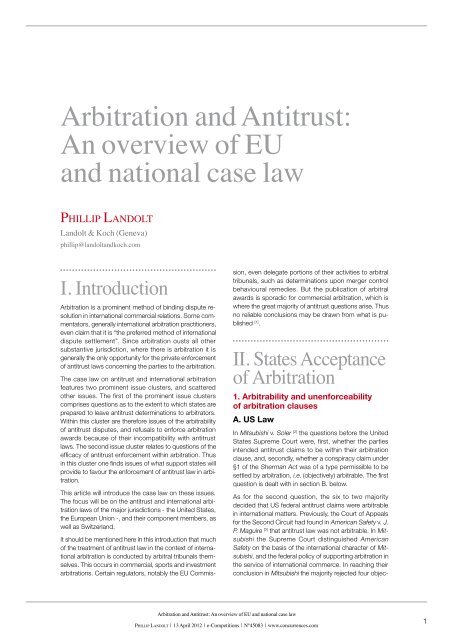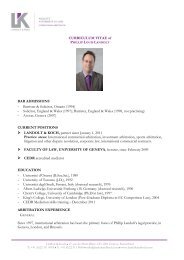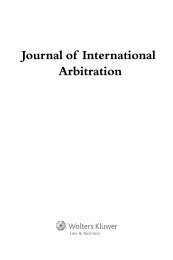Arbitration and Antitrust An overview of EU and national case law
Arbitration and Antitrust: An overview of EU and ... - Landolt & Koch
Arbitration and Antitrust: An overview of EU and ... - Landolt & Koch
- No tags were found...
Create successful ePaper yourself
Turn your PDF publications into a flip-book with our unique Google optimized e-Paper software.
<strong>Arbitration</strong> <strong>and</strong> <strong><strong>An</strong>titrust</strong>:<br />
<strong>An</strong> <strong>overview</strong> <strong>of</strong> <strong>EU</strong><br />
<strong>and</strong> <strong>national</strong> <strong>case</strong> <strong>law</strong><br />
PHILLIP LANDOLT<br />
L<strong>and</strong>olt & Koch (Geneva)<br />
phillip@l<strong>and</strong>olt<strong>and</strong>koch.com<br />
I. Introduction<br />
<strong>Arbitration</strong> is a prominent method <strong>of</strong> binding dispute resolution<br />
in inter<strong>national</strong> commercial relations. Some commentators,<br />
generally inter<strong>national</strong> arbitration practitioners,<br />
even claim that it is “the preferred method <strong>of</strong> inter<strong>national</strong><br />
dispute settlement”. Since arbitration ousts all other<br />
substantive jurisdiction, where there is arbitration it is<br />
generally the only opportunity for the private enforcement<br />
<strong>of</strong> antitrust <strong>law</strong>s concerning the parties to the arbitration.<br />
The <strong>case</strong> <strong>law</strong> on antitrust <strong>and</strong> inter<strong>national</strong> arbitration<br />
features two prominent issue clusters, <strong>and</strong> scattered<br />
other issues. The first <strong>of</strong> the prominent issue clusters<br />
comprises questions as to the extent to which states are<br />
prepared to leave antitrust determinations to arbitrators.<br />
Within this cluster are therefore issues <strong>of</strong> the arbitrability<br />
<strong>of</strong> antitrust disputes, <strong>and</strong> refusals to enforce arbitration<br />
awards because <strong>of</strong> their incompatibility with antitrust<br />
<strong>law</strong>s. The second issue cluster relates to questions <strong>of</strong> the<br />
efficacy <strong>of</strong> antitrust enforcement within arbitration. Thus<br />
in this cluster one finds issues <strong>of</strong> what support states will<br />
provide to favour the enforcement <strong>of</strong> antitrust <strong>law</strong> in arbitration.<br />
This article will introduce the <strong>case</strong> <strong>law</strong> on these issues.<br />
The focus will be on the antitrust <strong>and</strong> inter<strong>national</strong> arbitration<br />
<strong>law</strong>s <strong>of</strong> the major jurisdictions - the United States,<br />
the European Union -, <strong>and</strong> their component members, as<br />
well as Switzerl<strong>and</strong>.<br />
It should be mentioned here in this introduction that much<br />
<strong>of</strong> the treatment <strong>of</strong> antitrust <strong>law</strong> in the context <strong>of</strong> inter<strong>national</strong><br />
arbitration is conducted by arbitral tribunals themselves.<br />
This occurs in commercial, sports <strong>and</strong> investment<br />
arbitrations. Certain regulators, notably the <strong>EU</strong> Commission,<br />
even delegate portions <strong>of</strong> their activities to arbitral<br />
tribunals, such as determinations upon merger control<br />
behavioural remedies. But the publication <strong>of</strong> arbitral<br />
awards is sporadic for commercial arbitration, which is<br />
where the great majority <strong>of</strong> antitrust questions arise. Thus<br />
no reliable conclusions may be drawn from what is published<br />
[1] .<br />
II. States Acceptance<br />
<strong>of</strong> <strong>Arbitration</strong><br />
1. Arbitrability <strong>and</strong> unenforceability<br />
<strong>of</strong> arbitration clauses<br />
A. US Law<br />
In Mitsubishi v. Soler [2] the questions before the United<br />
States Supreme Court were, first, whether the parties<br />
intended antitrust claims to be within their arbitration<br />
clause, <strong>and</strong>, secondly, whether a conspiracy claim under<br />
§1 <strong>of</strong> the Sherman Act was <strong>of</strong> a type permissible to be<br />
settled by arbitration, i.e. (objectively) arbitrable. The first<br />
question is dealt with in section B. below.<br />
As for the second question, the six to two majority<br />
decided that US federal antitrust claims were arbitrable<br />
in inter<strong>national</strong> matters. Previously, the Court <strong>of</strong> Appeals<br />
for the Second Circuit had found in American Safety v. J.<br />
P. Maguire [3] that antitrust <strong>law</strong> was not arbitrable. In Mitsubishi<br />
the Supreme Court distinguished American<br />
Safety on the basis <strong>of</strong> the inter<strong>national</strong> character <strong>of</strong> Mitsubishi,<br />
<strong>and</strong> the federal policy <strong>of</strong> supporting arbitration in<br />
the service <strong>of</strong> inter<strong>national</strong> commerce. In reaching their<br />
conclusion in Mitsubishi the majority rejected four objec-<br />
<strong>Arbitration</strong> <strong>and</strong> <strong><strong>An</strong>titrust</strong>: <strong>An</strong> <strong>overview</strong> <strong>of</strong> <strong>EU</strong> <strong>and</strong> <strong>national</strong> <strong>case</strong> <strong>law</strong><br />
PHILLIP LANDOLT l 13 April 2012 l e-Competitions l N°45083 l www.concurrences.com<br />
1





